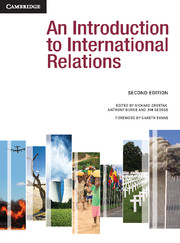Book contents
- Frontmatter
- Contents
- Tables, Figures and Boxes
- Contributors
- Preface and acknowledgements
- An Introduction to International Relations: The origins and changing agendas of a discipline
- 1 Theories of International Relations
- 2 The Traditional Agenda
- 9 The Modern State
- 10 Nations and Nationalism
- 11 Security
- 12 Arms Control
- 13 The Causes of War
- 14 The Changing Character of Warfare
- 15 The Ethics and Laws of War
- 16 International Law
- 17 International Society and European Expansion
- 18 Diplomacy
- 19 Great Powers
- 20 The Cold War
- 3 The New Agenda
- Glossary of Terms
- Bibliography
- Index
- References
18 - Diplomacy
from 2 - The Traditional Agenda
- Frontmatter
- Contents
- Tables, Figures and Boxes
- Contributors
- Preface and acknowledgements
- An Introduction to International Relations: The origins and changing agendas of a discipline
- 1 Theories of International Relations
- 2 The Traditional Agenda
- 9 The Modern State
- 10 Nations and Nationalism
- 11 Security
- 12 Arms Control
- 13 The Causes of War
- 14 The Changing Character of Warfare
- 15 The Ethics and Laws of War
- 16 International Law
- 17 International Society and European Expansion
- 18 Diplomacy
- 19 Great Powers
- 20 The Cold War
- 3 The New Agenda
- Glossary of Terms
- Bibliography
- Index
- References
Summary
Introduction
This chapter makes three main arguments: first, that ideas and practices of diplomacy have a multi-millennial history, much longer than is generally thought. Second, that this long history has been characterised by both continuity and change. As a result, diplomacy has been as much adaptive as resistant to change. And, third, that diplomacy is not diminishing in importance and that it – and the diplomats who carry it out – should be regarded as evolving and as important to the theory and practice of international relations. To assess these claims, the chapter first addresses the issue of defining diplomacy, then it examines the evolution of diplomacy in terms that may be characterised broadly as pre-modern, modern, and postmodern, and finally the chapter evaluates the relationship between diplomacy and the study of International Relations (IR).
Defining diplomacy: what is diplomacy and who are the diplomats?
Diplomacy is conventionally understood as the processes and institutions by which the interests and identities of sovereign states are represented to one another. Diplomats are understood to be people accredited by those they represent to undertake this work. We should be careful with definitions, however (see Box 18.1 for examples). They clarify the ways in which people use a term; they do not capture its true meaning, if there is such a thing, or its best use. Thus, some definitions of diplomacy emphasise a particular diplomatic activity: for example, negotiation (Nicolson [1939] 1969). Others stress the manner in which the activity should be undertaken: for example, with honesty, tact and understanding (Callières [1717] 2000; Satow [1917] 1979) or peacefully (Berridge 2010). Still others pay attention to who is entitled to undertake it and on behalf of whom – claiming, for example, that only the official representatives of sovereign states and international organisations may be properly viewed as engaging in diplomacy (Vienna Convention 1961). Rather than trying to pin down the best definitions of diplomacy and diplomats, therefore, it is more interesting to chart how and why the popularity and use of different ones changed over time and from place to place. Why, for example, did Edmund Burke feel the need in 1797 to anglicise the French term diplomatie (E. Burke [1797] 1899: 450)? Why, in America, is the distinction between diplomacy and foreign policy less acknowledged than in Europe (Kissinger 1994, David Clinton 2011)? And why, nearly everywhere, do people now seek to broaden the use of the term and call a wide range of humanitarian, cultural and commercial activities diplomacy, and whoever undertakes them diplomats (Leonard and Alakeson 2000)?
- Type
- Chapter
- Information
- An Introduction to International Relations , pp. 256 - 267Publisher: Cambridge University PressPrint publication year: 2011



